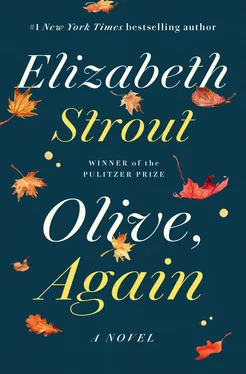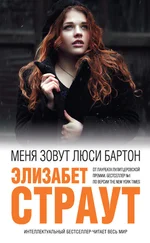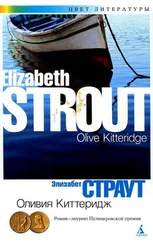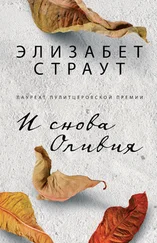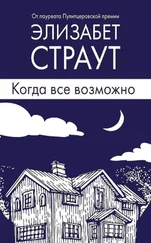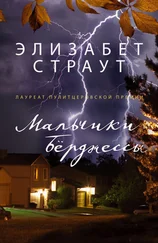Jack’s voice: “You’re a snob, Olive. You think being a reverse snob is not being a snob? Well, you’re a snob, my dear.”
Olive had approached Andrea L’Riuex that day at the marina because the girl was famous. That’s why she had sat herself down and talked to her like she knew her. If Andrea L’Rieux had never become the Poet Laureate of the United States, if she had just been what Olive would have expected of her—another woman with children and sort of happy and mostly unhappy (her sad-faced walks)—then Olive would never have approached her. She hadn’t even liked the girl’s poetry, except for the line about the darkness and the red leaves. But she had sat down across from her because she was famous. And also because she, Olive, was—Andrea was right—lonely. She, Olive Kitteridge, who would not have thought this about herself at all. She said fiercely, out loud, “You remember this, Olive, you fool, you remember this.”
In the semi-dark of the bedroom, Olive got out her small computer, and she went to Andrea’s Facebook page. She had never written a comment before, and she at first couldn’t figure out how to do it. But then she did, and she wrote, “Saw your new work. Good for you.” She sat looking out the window at the darkness of the field; only one streetlamp, far away, could be seen from here. She went back to the computer and added a line: “Glad you’re not dead.”
For a long time, Olive sat on the bed; she was just looking through the glass at the dark field. It seemed to her she had never before completely understood how far apart human experience was. She had no idea who Andrea L’Rieux was, and Andrea had no idea who Olive was, either. And yet. And yet. Andrea had gotten it better than she had, the experience of being another. How funny. How interesting. She, who always thought that she knew everything that others did not. It just wasn’t true. Henry . This word went through Olive’s mind as she gazed through the window at the darkness. And then: Jack . Who were they, who had they been? And who—who in the world—was she? Olive put one hand to her mouth as she contemplated this.
Then Olive put the computer away and got back into bed. She spoke the words softly out loud: “Yup, Andrea. Good for you. Glad you’re not dead.”
The End of the Civil War Days
The MacPhersons lived in a large old house on the outskirts of Crosby, Maine. They had been married for forty-two years, and for the last thirty-five they had barely spoken to each other. But they still shared the house. In his youth, Mr. MacPherson—his name was Fergus—had had an affair with a neighbor; back then there was no forgiveness and no divorce. So they were stuck together in their house. For a while their younger daughter, Laurie, had come back home briefly, her marriage had broken up and she and her six-year-old son came to live with them—both Fergus and his wife had been gladdened by their arrival, in spite of its cause—but very soon Laurie said that “their continued arrangement,” as she put it, was too unhealthy for her child, and so she left, moving to a small apartment near Portland.
Their arrangement was this: They lived with strips of yellow duct tape separating the living room in half; it ran over the wooden floor and right up against the rug that Ethel MacPherson had put on her side of the room; and in the dining room the tape was there as well, running over the dining room table, dividing it in half exactly, running down into the air and then onto the floor. Each night Ethel made dinner and placed her plate on one side of the taped table, and placed her husband’s plate on the other side. They ate in silence, and when Ethel was done eating she put her plate on her husband’s side of the table and then she left the room; he did the dishes. The kitchen had been taped too, years earlier, but because of the sink and the cupboards, which both MacPhersons needed access to, especially in the morning, they had let the tape become peeled in places and they mostly ignored it. As they ignored each other. Their bedrooms were on separate floors, so that was not an issue.
The main issue, naturally, was the televisions in their living room. On either side of the duct tape sat a television; Fergus’s was the bigger of the two, and Ethel’s was older. For years they sat there in the evenings—Fergus drawing his fingers through his beard; Ethel, who in the early years might have had her curlers in, but eventually she cut her hair short and dyed it an orangey-yellow; she still was often knitting—watching separate shows on their televisions, each turning up the volume to drown out the other. But then a few years ago Fergus—right before he retired from the ironworks, where he had been a draftsman—went and got a fancy set of earphones that were attached to something like an old-fashioned telephone cord that he stuck into his television, and so he sat in his lounge chair with his earphones on, and Ethel could keep her television down to almost a regular sound.
—
In any event, their older daughter, Lisa, was coming home in a week for her annual visit from New York City, where she had moved eighteen years earlier. There was something about her that Fergus could never quite put his finger on: She was a pretty thing, but she never mentioned a boyfriend except for once in a very great while. Now she was close to forty, and the fact that she would probably not have children saddened him. Fergus had a special place for Lisa in his heart that he did not have for her younger sister, Laurie, though he loved Laurie as well. Lisa had a job as the administrative assistant to a program at the New School. “So you’re a secretary,” Fergus had said, and she had said, Yeah, well, basically she was.
Now—it was a Friday evening in early August—Fergus said out loud to his television, “Goddammit,” and this caused his wife to begin to sing. “La-la-lahhh-la, deedly-dee-dum,” she sang out loudly because she hated when he swore, but he had his earphones on and probably couldn’t hear, so she gave it up. Fergus had sworn because his daughter’s visit was going to coincide with the Civil War Days in the park next week, which Fergus always took part in, dressing up like a Union soldier and marching back and forth on Saturday and shooting a rifle—they were blanks, of course—and then he slept in his little canvas pup tent in the park with the other soldiers, and they cooked their meals on tiny makeshift stoves like the kind that were used in the Civil War days. It was Fergus’s job to beat the drum, along with one other man, a nasty old codger named Ed Moody from down the coast who—when he joined a few years ago—seemed to think that he was the drummer; there had been trouble about that, but the regiment had finally said that both men could beat a drum. In truth, Fergus’s enthusiasm for this entire thing had been waning, but he knew his wife laughed at him for partaking in it, and so he continued to do so. He had, when he thought about it, always preferred the St. Andrews group—the Highland Games when men of Scottish ancestry all wore their kilts and marched about the fairgrounds, bagpipes whining; Fergus played the drum for them as well, as he marched in his kilt of the MacPherson plaid.
The dog, who had been lying in the corner of the room, a small—now old—cocker spaniel named Teddy, rose and walked over to Fergus and wagged his tail. Fergus took his earphones off. Ethel said, “I hope your father plans on taking you out, I don’t feel like it tonight,” and Fergus said, “Tell your mother to hush up.” Fergus rose, and as he was leaving with the dog he said, “Teddy, I guess we’ll go to the grocery store,” and his wife said, “I hope to heck Fergus doesn’t forget the milk.” In this way, they communicated.
Читать дальше
